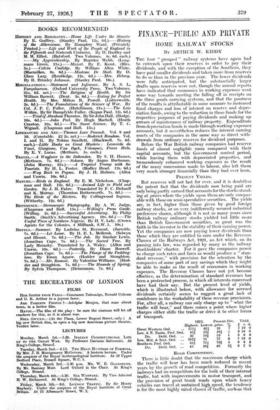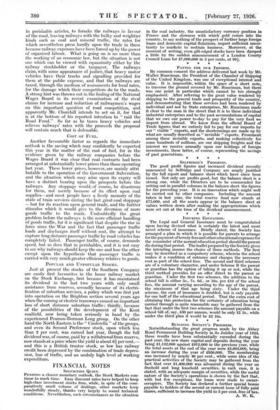BY ARTHUR W. KIDDY THE four " grouped " railway
systems have again had to entrench upon their reserves in order to pay their dividends, and with the exception of the Southern, they have paid smaller dividends and taken more from reserves to do so than in the previous year. The lower dividends were fully anticipated, but the substantially larger drafts upon reserves were not, though the annual reports have indicated that economies in working expenses went some way towards meeting the falling off in receipts on the three goods carrying systems, and that the poorness of the results is attributable in some measure to increased fixed charges and loss of interest on reserve and depre- ciation funds, owing to the reduction in these funds for the respective purposes of paying dividends and making up arrears of maintenance of railway property. Expenditure from depreciation funds is made through working expenses accounts, but it nevertheless reduces the interest earning assets of the companies in the same way as direct with- drawals from ordinary reserves for dividend purposes.
Before the War British railway companies had reserve funds of almost negligible sums compared with their capital accounts, but the Government control period, while leaving them with depreciated properties, and tremendously enhanced working expenses as the result of the many concessions made to labour, also left them very much stronger financially than they had ever been.
PRESENT YIELDS.
But reserves will not last for ever, and it is doubtless the patent fact that the dividends now being paid are only being partly earned that accounts for the stocks stand- ing at prices where the yields upon them are only compar- able with those on semi-speculative securities. The yields arc, in fact, higher than those given by good foreign railway stocks, or on very indifferently secured industrial preference shares, although it is not so many years since British railway ordinary stocks yielded but little more than British Government securities, so great was the faith in the investor in the stability of their earning power. Yet the companies are now paying lower dividends than those which they are entitled to earn under the Revenue Clauses of the Railways Act, 1921, an Act which, on its passing into law, was regarded by many as the railway stockholders' charter. For it gave the companies power to charge such rates and fares as would produce a " stan- dard revenue," with provision for the retention by the companies of some part of any savings which they might be able to make as the result of economies in working expenses. The Revenue Clauses have not yet become effective, as the determination of standard revenues has been a protracted process, in which all interests concerned have had their say. But the present level of yields, which is illustrated below, with allowance for accrued dividends certainly seems to suggest a great lack of confidence in the workability of these revenue provisions. For, after all, a railway can only charge up to " what the traffic will bear," and there comes a point where higher charges either stifle the traffic or drive it to other forms of transport.
1925. Present Div.
Highest. Lowest. price. % Great Western Ord. .. 1111 821 91 7
Lon. & N. Eastn. Pref. Ord. 831 531 581 L
Do. Defd. Ord. .. 32 181 19 1 Lon. Mid. & Soot. Ord. .. 102f 71 77 6 Southern Pref. Ord. 851 711 791 5
Do. Defd. Ord. .. 45 381 46 31
ROAD COMPETITION.
There is little doubt that the maximum charge which the traffic will bear has been much reduced in recent years by the growth of road competition. Formerly the railways had no competitors for the bulk of their internal traffic, but with improvements in motor transport, and the provision of great trunk roads upon which heavy vehiclei can travel at sustained high speed, the tendency is for the most highly rated classes atraffic, suels.as that
Yield. s. d.
7 19 0 8 18 0 5 9 6 7 19 0 6 8 3 8 2 0
in perishable articles, to forsake the railways in favour of the road, leaving railways with the bulky and weightier kinds such as coal and mineral traffic, the rates for which nevertheless press hardly upon the trade in them because railway expenses have been forced up by the power of organized labour. What is going on is no more than the working of an economic law, but the situation is not one which can be viewed with equanimity either by the railway stockholder or the taxpayer. The railways claim, with some appearance of justice, that heavy motor vehicles have their tracks and signalling provided for them at the public expense, and that the railways are taxed, through the medium of assessments for local rates, for the damage which their competitors do to the roads. A strong hint was thrown out in the finding of the National Wages Board in its recent examination of the rival claims for increase and reduction of railwaymen's wages on this important question of road competition, and apparently Mr. Churchill intends to act on it, for that is at the bottom of his reported intention to " raid the Road Fund." So far as he taxes heavy vehicles and relieves railways' rates with the proceeds the proposal will contain much that is defensible.
COST OF FUEL.
Another favourable factor as regards the immediate outlook is the saving which may confidently be expected this year in the matter of the cost of fuel, for in the evidence given by the railway companies before the Wages Board it was clear that coal contracts had been arranged at substantially lower prices than those operating last year. These lower prices, however, are mainly attri butable to the operation of the Government Subvention, and the situation which may arise upon its expiry will have a distinct bearing upon the prospects before the railways. Any stoppage would, of course, be disastrous for them, not merely because of its effect upon coal supplies—and most people have a lively memory of the state of train services during the last great coal stoppage —but for its reaction upon general trade, and the further stimulus which it would give to the diversion of more goods traffic to the roads. Undoubtedly the great problem before the railways is the more efficient handling of goods traffic, for it is significant that despite the rise in fares since the War and the fact that passenger traffic loads and discharges itself without cost, the attempt to capture long distance passenger traffic by road vehicles has completely failed. Passenger traffic, of course, demands speed, but so does that in perishables, and it is not easy to see why railways should keep the one and lose the other except upon the hypothesis that passenger traffic is carried with very much greater efficiency relative to goods.
POPULAR AND UNPOPULAR STOCKS.
Just at present the stocks of the Southern Company are easily first favourites in the home railway market on the Stock Exchange, first because it has maintained its dividend in the last two years with only small assistance from reserves, secondly because of its electri- fication of suburban services, a policy which was first put into operation on the Brighton section several years ago when the coming of electric tramways caused an important loss of short distance suburban traffic ; thirdly, because of the possibilities of the development of the Kent coalfield, now being taken seriously in hand by the experienced Pearson-Dorman Long group. On the other hand the North Eastern is the " Cinderella " of the groups, and even its Second Preference stock, upon which less than 2 per cent. was earned last year, though the full dividend was, of course, paid by a withdrawal from reserve, now stands at a price where the yield is about 61 per cent.— and this is a British trustee stock, so low has railway credit been depressed by the combination of trade depres- sion, loss of traffic, and an unduly high level of working expenditure.























































 Previous page
Previous page